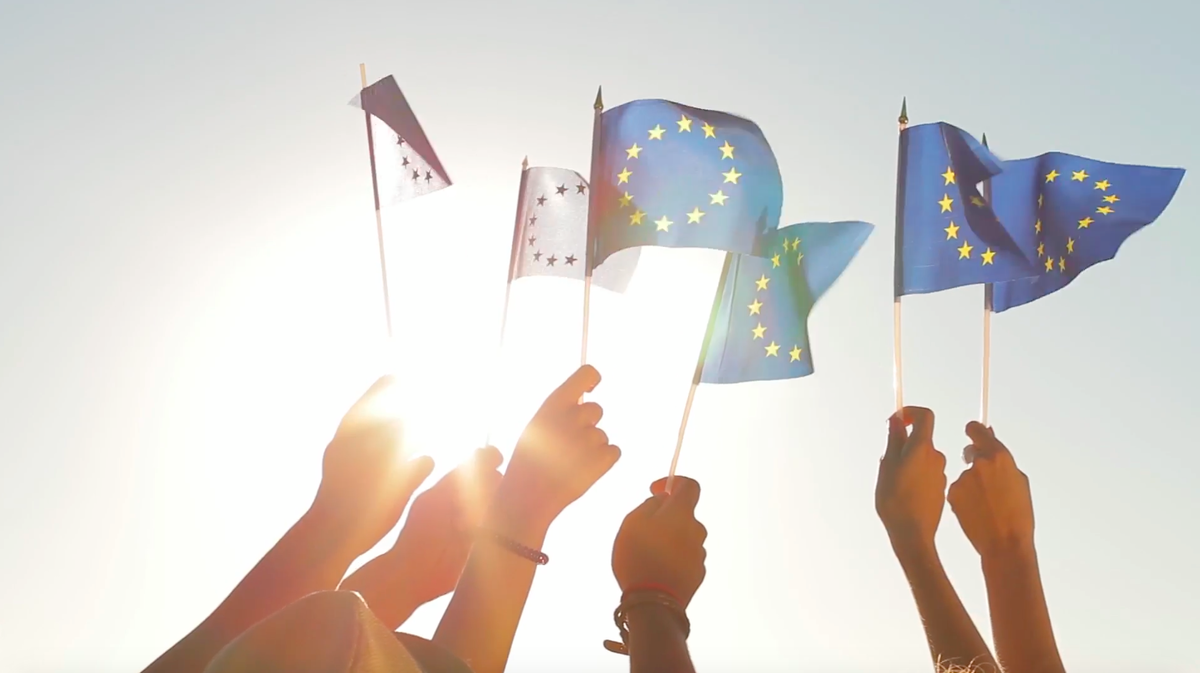Pictured from left: Paulina Dannhäuser, Johanna Sinn, Marie Hirsch und Fabian Willemsen at the Cagnes-sur-Mer-Promenade, where traces of a previous philsophy project can be found at the columns of light.
Sitting in a Passau café overlooking the Cagnes-sur-Mer promenade, student Marie Hirsch briefly thought she couldn't believe her eyes. On one of the lampposts along the promenade, she spotted a vertical inscription: "What ought I to do?" Hirsch, who is writing her master's thesis on Immanuel Kant, realised that it was one of the questions from which he developed his philosophy of Enlightenment. "I thought I was already hallucinating and seeing Kant everywhere," she says and laughs.
The questions on the columns of light in the centre of Passau are the traces of a previous publicly effective philosophy project from 2007 and 2008. A team of young researchers and students led by Thomas Mohrs, who is now a professor at the University of College Education in Upper Austria, brought Immanuel Kant's philosophy into Passau's urban society - among other things with display walls on which citizens wrote down their thoughts on Kant's work and other topics. The researchers who organised the campaign at the time are no longer at the University of Passau. What remains are the banners with Kant's questions, which keen observers, such as Marie Hirsch, can still spot in the centre of Passau today.
The new BMBF project PASSAUtonomy, in which a team of students led by doctoral student Johanna Sinn and Marie Hirsch from the Chair of Applied Ethics has set itself the goal of engaging in a dialogue on Kant's philosophy with various target groups outside the university public during the Kant anniversary year, follows in the tradition of this project.
The title PASSAUtonomy alludes to a quote from Immanuel Kant: "(...) what, then, can freedom of the will be other than autonomy, that is, the will's property of being a law to itself? " The discussions will primarily focus on concept of freedom of the Königsberg philosopher, who would have celebrated his 300th birthday on 22 April 2024. With this project, the Passau team successfully participated in the university competition as part of the BMBF Science Year 2024 on the topic of freedom.
What I find fascinating about Kant is that even though his texts are 300 years old, they still raise very fundamental questions and are therefore a good point of reference for today's philosophical discussions.“
Johanna Sinn, doctoral student, Uni Passau
"What I find fascinating about Kant is that even though his texts are 300 years old, they still raise very fundamental questions and are therefore a good point of reference for today's philosophical discussions," explains Johanna Sinn her motivation. "We are convinced that philosophy should not only take place in lecture halls, but in society as a whole," says Marie Hirsch. Therefore, there are three sub-projects aimed at different target groups:
- Exhibition sub-project: Students Fabian Willemsen and Lena Scholz are planning an exhibition and a panel discussion for the university community. They want to explore the relevance of Kant's concept of freedom and what it means when Kant talks about freedom, self-legislation and autonomy.
- School sub-project: Student teacher Marian Micke is particularly enthusiastic about the school workshops that the project offers in cooperation with the university student club GoverNET to involve students in philosophical discussions. He wants to know: Is Kant still relevant today and what can we still learn from him?
- Beer garden sub-project: Student teacher Julia Berner is looking forward to interesting discussions with the public in beer gardens and pubs. Her topics inspired by Kant are What is enlightenment? How can people escape their self-inflicted immaturity?
The team is planning activities throughout the summer term. The first event of the beer garden project will take place on 22 May at the Welcome Bar in Passau's old town. For the sub-project aimed at the university community, the student team is looking for fellow students to support and contribute ideas. If you are interested, please contact Lena Scholz by email.
The research magazine will accompany the activities with regular reports and impressions. Students are also responsible for this - as part of a practical seminar on science communication that Daniela Polzer, lecturer at the Chair of German Literature and Film at the University of Passau, is offering this summer semester. She is familiar with the BMBF university competition from last year's successful Codeversum project, which she prepared for various media channels.
This text was machine-translated from German.
Professor Karoline Reinhardt
What kind of ethical questions are raised by of social and political transformation?
What kind of ethical questions are raised by of social and political transformation?
Professor Karoline Reinhardt is Junior Professor for Applied Ethics at the University of Passau. Before taking on her position at the University of Passau, she was a PostDoctoral fellow at the Ethics & Philosophy Lab of the DFG Cluster of Excellence “Machine Learning: New Perspectives for Science” and the International Center for Ethics in the Sciences and Humanities at the University of Tübingen. Previous to that, she held research and teaching positions at universities in Ankara, Graz, New Orleans, and Munich. She is a member of the Young Academy of the Heidelberg Academy of Sciences.
Ten universities from nine nations are currently pursuing a common goal: as part of a European University Network (EUN) entitled "REform: Responsible Innovation & Transformation for Europe - a new transformative European University Alliance", a network for teaching, research and transfer is to be created that takes ethical aspects into account (Interview on the topic). Researchers from Passau will contribute expertise on questions of responsible innovation and ethics across disciplines and faculties. To the topic page.






![[Translate to English:] [Translate to English:]](https://www.digital.uni-passau.de/fileadmin/_processed_/3/5/csm_Nour_Shaban_fc4be1f6b2.png)